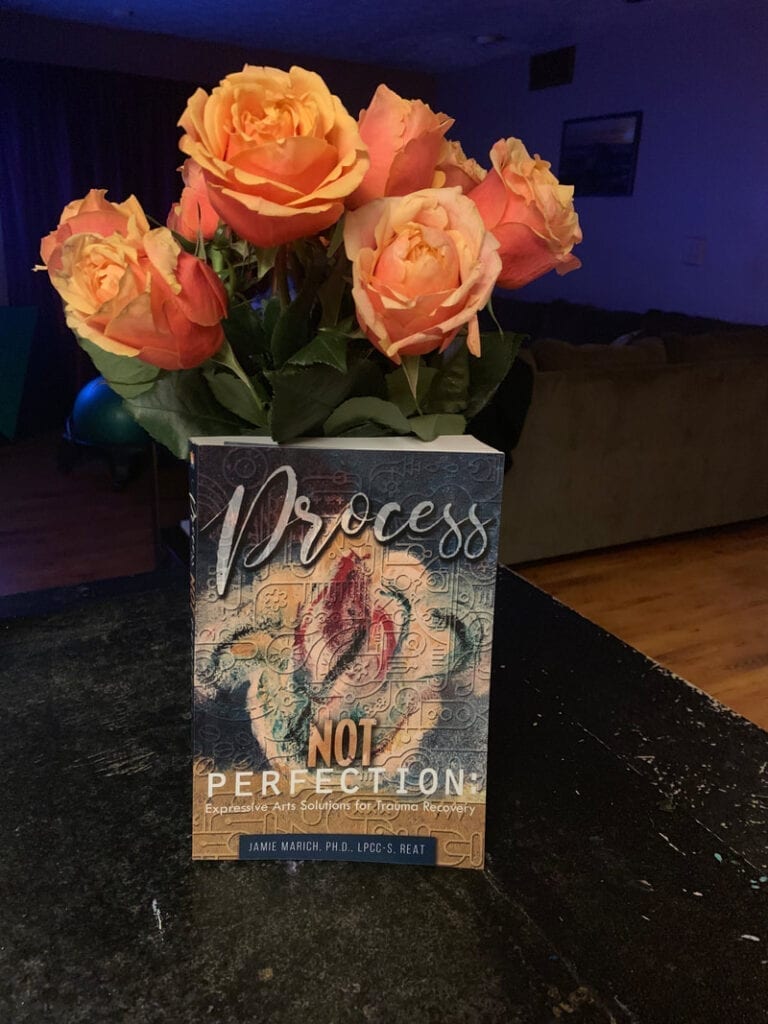I can’t remember when I first received flowers—it was likely when I made my first communion around age seven. I fondly recall getting flowers from my friends and family when I was in my first big stage show at twelve. The confirmation name I chose for myself when I received the sacrament in the Roman Catholic Church is Marie-Therese. I selected the name to honor St. Therese of Lisieux, also called the Little Flower. The first tattoo I got was of a flower (a peace lily on my hip). Even though both of my marriages ended in bitter divorce, I still have several fond memories from both relationships that involve receiving flowers. On a recent pilgrimage to India, one of my drivers—a lovely man named Ratan—climbed a tree to pick me the state flower of Uttrakhand in the foothills of the Himalayas. This gesture had me beaming from ear-to-ear and made me realize just how much I love receiving flowers.
So what better way to honor the sacredness that I am than to practice buying myself flowers? We can put so much weight, especially as women, on what it means to receive flowers as a gesture of love or appreciation. But who is to say that for flowers to have such appreciative value, they have to be gifted by someone else?
Although I’ve picked flowers for myself over the years, I do not consciously recall buying myself a bouquet of flowers until about two years ago. I purchased a beautiful dozen of pink roses to celebrate my separation from marriage number two and all of the pain it represented. After that marriage ended, I entered into a period of deep inquiry to investigate and ultimately heal the remaining layers of relational trauma that kept me in this loop of unserving relationships. And in my sadhana (spiritual practice), my guides led me back to a favorite poem from which I’ve drawn great strength over the years, After A While by Veronica A. Shofstall. After my first divorce, I wrote a song called “Grace of a Woman” (which became the title track to the last album I recorded in 2012) based on a line from this poem. The repeating line in her poem is “after a while you learn”… During that period in my life, this line most resonated for me:
And you begin to accept your defeat with your head up and your eyes ahead
With the grace of a woman, not the grief of a child
Clearly that was the lesson my foolish heart needed at the time. Yet with one of the classical definitions of foolish being “slow to learn,” there was still more healing to be done…
Within a few weeks after my second husband and I parted ways, I remember standing at the entrance to the grocery store near my home where the florist is located and Veronica’s poem came back to me like a lightning bolt. Specifically the wisdom:
After a while you learn that even sunshine burns if you get too much
So you plant your own garden, and decorate your own soul
Instead of waiting for someone to bring your flowers
Thus, as a ceremony representing the new phase of healing that life was bringing me through, I bought myself that bouquet of the most beautiful pink roses. I brought them home, put them in a vase, and all felt right with the world.
“I can do this,” I resolved, “I can be okay by myself, as I am.”
During the period of initial healing I bought myself flowers regularly to keep reminding myself of this lesson. Truthfully, I fell out of the practice after about six months. I started to feel much better. And then, about a year after the separation, I started seeing someone. Although not to the same extent as in earlier seasons of my life, I noticed some of the same patterns about needing to be wanted pop back up and disturb the peace in my life. Even though I’m slow to learn when it comes to my personal healing, I do learn and I’ve been able to nip much of this potential destruction in the bud.
Getting my latest book Process Not Perfection prepared and ready for publication happened alongside me doing some deep therapeutic digging about the remnants of relational trauma. Healing those wounds has proven to be the greatest process of my life. The day that the book officially released, I allowed myself to sit on my couch, breathe, and take it all in. And then the wisdom inherent in Veronica’s poem came back once again—go out and buy yourself flowers. Celebrate you! Celebrate not just all that you’ve accomplished, celebrate the wonder that you are! Indeed, decorate your own soul…
We can decorate our soul in a variety of ways along our healing path in ways that are not entangled with attachments to others. Even if you are in a committed relationship, please consider nourishing yourself in this way. Perhaps planting a garden is more your style than buying flowers. Do it. Do whatever is going to help you celebrate your own wonder while cultivating beauty in your life. I am worth it, you are worth it. And perhaps if we deepen into this practice of gifting ourselves with the beauty we deserve, we will indeed spread that healing like wildflowers through this suffering world desperately in need of that colorful energy.





2 Responses
Amen. Thank you.
After 50 years of marriage, my dearest Beloved husband Nicholas suddenly passed away suddenly on Dec 19 2023 at 4.10a. It has been devastating until today. This Emptiness that I feel inside is simply “Horrible”. Our daughter Daniela are in pieces. The Power of Praying is helping us. We feel him on daily basis and know he is watching over us. I always liked flowers and have been buying myself Orchids. I find such a relaxing delight in seeing what our God has created. I have been doing HATHA YOGA since I was 5 but seeing the different shades and colors it gives me a sense of Serenity, Peace and Harmony. I buy them to myself because I deserve this Beauty of Simplicity to come into myself, feeling that my Nicholas is bringing me such beauties into my heart. The next 20 years of my life are going to be the Biggest Challenge of my life ti live a life without my Nicholas but I need to live for our daughter Daniela because she only has ne now and her husband. Yesterday, she told me:”Mom, I don’t want nothing for XMAS…I simply pray to Our God not to take my mother away yet…don’t take her like you took my Dad without warning…please God delay her departure because I need my Mom like I need it my Daddy”. I gave her a big hug but after she left, I cry. God, please help me to Endure this feelings of missing my Nicholas so much. Let the Beauty of these orchids come into my life to Endure all my future Challenges to give my Best to our daughter until my time comes to be United with my Nicholas. Peace Profund, Mercedes